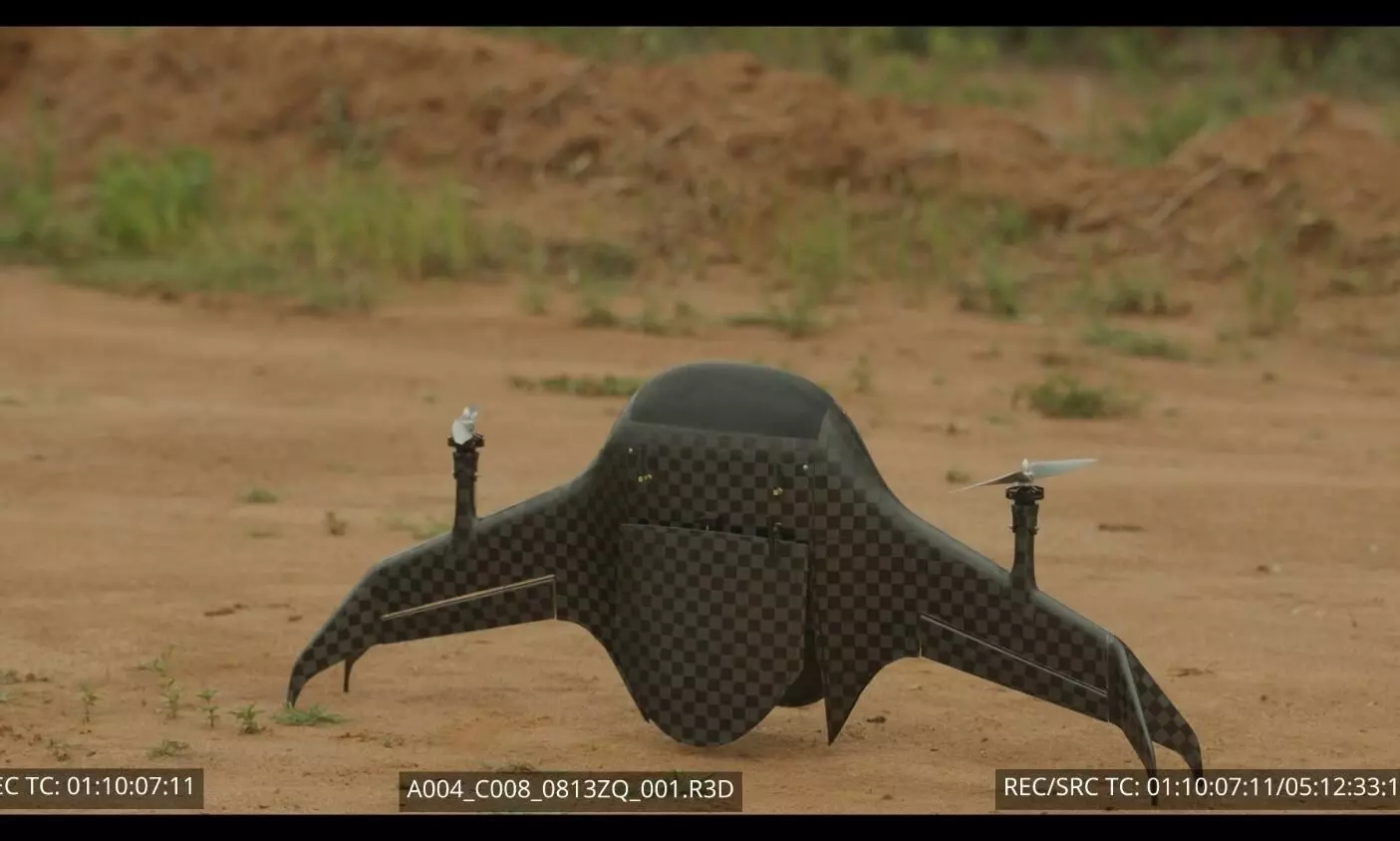
Airbound raises $8.65M in funding, launches pilot with Narayana Health
This three-month pilot will deploy Airbound’s blended-wing-body VTOL drones to deliver medical tests, blood samples, and critical supplies in Bengaluru, conducting around ten deliveries daily.

Airbound, a Bengaluru-based deep-tech company specialising in autonomous delivery drones, has secured $8.65 million in seed funding and announced a pilot collaboration with Narayana Health for drone-based medical deliveries. The announcement was made at the company headquarters in Hoskote,Bengaluru today (October 14, 2025). The funding round was led by Lachy Groom, co-founder of Physical Intelligence, and included participation from Humba Ventures, Lightspeed Venture Partners, and senior executives from Tesla, SpaceX, and Anduril.
Naman Pushp, founder and CEO of Airbound, said, “We are grateful to our incoming and current investors for supporting our vision to make the cost of delivery negligible.” The project aims to validate Airbound’s technology in a demanding healthcare logistics environment, where both reliability and efficiency are essential.
This fresh round builds upon Lightspeed’s initial investment in November 2024, when Airbound was still in stealth mode. Lightspeed was impressed by Pushp’s work from the age of 17, having declined admission to Carnegie Mellon University to focus on developing a VTOL prototype that reimagined last-mile delivery. Since its inception, Airbound has focused on breaking the limitations of current logistics, particularly the costly and inefficient last mile.
While global freight has improved with hub-and-spoke shipping models, the last mile remains costly, manual, and inefficient. A package shipped thousands of miles can cost less per kilogramme-mile than the final 10 miles to a consumer’s door. A report published by Lightspeed in November 2024 estimated that roughly $500 billion of the $1.02 trillion global food delivery revenue was absorbed by delivery costs alone.
Airbound aims to revolutionise this segment by making the last mile effectively cost-free. The company’s drones excel in four key areas: affordability, durability, aerodynamic capability to carry loads exceeding their own weight, and autonomous VTOL operation without the need for supporting infrastructure. These drones launch vertically like rockets and then transition into energy-efficient horizontal flight.
This design improves on both tilt-rotor and quadplane models, which often compromise range or payload capacity. Their proprietary carbon fibre manufacturing process yields drones so lightweight they fall similarly to a sheet of A4 paper yet provide 13 times better strength-to-weight ratio than the best existing materials. This reduces the battery and motor wear costs that typically account for up to 80% of drone operating expenses.
Airbound drones can cruise at speeds of 60 km/h, reaching full speed within 5 seconds.Their design features a payload-to-weight ratio of 1 kg to 1.5 kg, with only 10% of the maximum takeoff weight being structural.
By late 2025, this is expected to reduce to 6%. The drones operate nearly silently, producing noise comparable to a soft conversation (~60 decibels), becoming effectively inaudible at cruising altitude except to the package recipient. This performance enables last-mile deliveries to be completed quickly and discreetly, with projected costs dropping below one dollar today and potentially under five cents within three years.
Lachy Groom reflected on Airbound’s innovation, stating, “Airbound’s approach to drone delivery addresses fundamental physics and economics problems that have limited the scalability of existing solutions.”
This three-month pilot will deploy Airbound’s blended-wing-body vertical takeoff and landing (VTOL) drones to deliver medical tests, blood samples, and critical supplies in Bengaluru, conducting around ten deliveries daily. Narayana Health’s Founder and Chairman, Dr Devi Shetty, said, “Our partnership with Airbound allows us to pilot a promising technology that could significantly improve the speed and reliability of medical deliveries.” The pilot programme not only tests Airbound’s drones in critical logistical applications but also provides regulatory progression and strengthens the company’s footing for broader market deployment.
Since Lightspeed’s initial bet, Airbound has welcomed additional investors, including GradCapital, Draper Associates, the Peter Thiel-backed 1517 Fund, Emergent Ventures, and founders from aerospace companies like Pixxel and Boom Supersonic. The recent funding brings Airbound’s total capital raised beyond $10 million.
The company plans to scale manufacturing to daily production rates and refine its systems ahead of a commercial rollout targeting 2026. By solving aerodynamic and material science challenges, Airbound hopes to redefine the economics of last-mile delivery, enabling access to essential goods irrespective of geographic barriers.
Airbound’s platform features autonomous navigation, precision package pickup, delivery, and return without any requirement for additional ground infrastructure or human intervention.
The drones are engineered and manufactured entirely in India and represent a new paradigm in supply chain logistics by bridging the gap between large-scale shipping efficiencies and personalised, rapid deliveries. This partnership with Narayana Health marks a milestone toward making drone delivery a reliable, affordable reality in one of the most demanding sectors.

